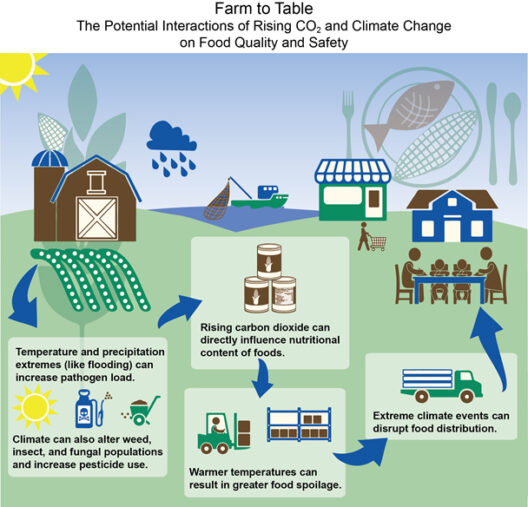Global warming is an insidious phenomenon that has captured the collective conscience of societies worldwide. It is not merely a scientific concern; it has morphed into a global imperative, demanding immediate and significant action to mitigate its effects. While the overwhelming data points to an undeniable warming trend, what captivates many is the juxtaposition of human advancement against the fragile resiliency of our planet’s ecosystems. This document elucidates practical steps for reducing global warming while highlighting the intricate tapestry of our relationship with the environment.
Understanding the Fundamentals
A crucial component of addressing global warming is grasping its underlying cause: the greenhouse effect, primarily induced by the rampant emission of greenhouse gases (GHGs) such as carbon dioxide (CO2) and methane (CH4). As human activities such as industrialization, deforestation, and fossil fuel combustion proliferate, so too do these gases, ensnaring heat within the atmosphere and inducing climatic shifts. This understanding is pivotal, as it frames our subsequent actions towards mitigation.
Adopting Renewable Energy Sources
The transition to renewable energy is one of the most effective strategies in the battle against global warming. Solar, wind, hydroelectric, and geothermal energy represent a plethora of options with minimal carbon footprints. For individuals, embracing solar panels for residential energy needs serves as a microcosm of this shift. Beyond personal benefits, such changes aggregate to significant reductions in GHG emissions. On a larger scale, policies promoting investment in renewable infrastructure can catalyze major reductions in carbon footprints for entire communities and nations.
Enhancing Energy Efficiency
Another constructive approach lies in enhancing energy efficiency within our homes and industries. Implementing energy-efficient appliances, transitioning to LED lighting, and reinforcing insulation are tangible interventions that can diminish energy consumption considerably. Furthermore, businesses can adopt energy management systems that optimize energy use through monitoring and control, yielding both financial savings and environmental benefits.
Transforming Transportation Systems
The transportation sector is a substantial contributor to global warming, largely due to fossil fuel reliance. Embracing alternative modes of transport, such as cycling, walking, or utilizing public transport, reduces vehicular emissions. Furthermore, the adoption of electric vehicles (EVs) promises to mitigate the adverse impacts of traditional transportation methods. Encouraging infrastructure development that supports EV charging stations and the promotion of car-sharing initiatives can catalyze a paradigm shift in mobility.
Advocating for Sustainable Practices in Agriculture
The agricultural sector plays a dual role—it contributes to greenhouse gas emissions and has the potential to sequester carbon. Practices such as agroforestry, crop rotation, and permaculture promote biodiversity, enhance soil health, and increase carbon sequestration. By advocating for organic farming and sustainable land management, we can ameliorate the adverse effects of agricultural emissions while fostering resilience within food systems.
Rethinking Waste Management
Waste management is oftentimes overlooked, yet it is intricately linked to greenhouse gas emissions. Landfills emit methane, a potent greenhouse gas, during the decomposition of organic matter. Transitioning to a circular economy—emphasizing reuse, recycling, and composting—can significantly reduce waste. By encouraging local composting initiatives and supporting businesses that minimize packaging, communities can collectively diminish their carbon burden.
Community Engagement and Education
A sustainable future also hinges on community engagement and education. Facilitating workshops, public forums, and awareness campaigns fosters an informed populace that is motivated to act. Education empowers individuals with knowledge regarding the gravity of climate change, motivating them to adopt eco-friendly practices in their daily lives. Collaborative projects that engage local stakeholders in environmental initiatives elicit collective responsibility toward combating global warming.
Influencing Policy Change
While individual actions are vital, influencing policy change is imperative for systemic impact. Citizens must advocate for legislation that addresses climate change comprehensively. Support for carbon pricing mechanisms and the enhancement of fuel efficiency standards encapsulates necessary steps toward regulating emissions at the corporate level. Grassroots movements can galvanize public interest and press governments to prioritize sustainability within their mandates.
Fostering Research and Innovation
Innovation is indispensable in our endeavors to mitigate global warming. Investing in research that explores novel technologies in carbon capture and storage can provide groundbreaking solutions. Moreover, fostering innovation in sustainable materials and green technology can yield alternative methods that lessen our collective impact on the planet. Public and private funding for research initiatives must be prioritized to unleash creative solutions that can combat climate change effectively.
Conclusion: A Collective Endeavor
Reducing global warming is an urgent call to action that requires collaborative efforts across all strata of society. By adopting renewable energy sources, enhancing energy efficiency, reforming transportation, advocating sustainable agriculture, rethinking waste management, engaging communities, influencing policy, and fostering research, individuals and organizations can play a transformative role in creating a sustainable future. It is a multifaceted approach that demands commitment, innovation, and the recognition that each action contributes to a larger collective endeavor. In harmonizing our existence with the environment, we not only safeguard our planet for future generations, but we also enrich our lives, restoring balance to the intricate relationship forged between humanity and nature.







